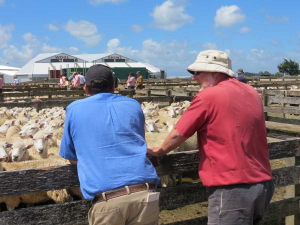M.I.A.
OPINION: The previous government spent too much during the Covid-19 pandemic, despite warnings from officials, according to a briefing released by the Treasury.
 All saleyards are currently closed, leaving just private paddock to paddock sales and online trading available.
All saleyards are currently closed, leaving just private paddock to paddock sales and online trading available.
Stock and Station agents have put together a set of protocols they hope will allow the country’s saleyards to reopen as soon as possible as the COVID-19 lockdown progresses.
All yards are currently closed, leaving just private paddock to paddock sales and online trading available.
The COVID-19 lockdown has come at a bad time of year, when autumn sales would normally be coming into full swing.
New Zealand Stock and Station Association (NZSSA) chairman Steve Morrison told Rural News he’s put together a discussion document hoping to convince MPI it is possible to set up revised protocols to allow saleyards to reopen.
It is intended to apply to special sales that need to progress urgently, whilst national COVID-19 response measures are still in place.
While not expecting immediate changes, Morrison says farmers need the yards to be open at this time of year, when stock needs to transition between farms – more so this year, going from drought into winter.
“There’s plenty of farmers looking to what they’re wanting to do with stock and getting a little bit concerned.
“Some may be able to live with four weeks, but they are needing to do something very pressing before winter.”
Morrison says the proposal outlined a “more COVID-friendly” way to operate a saleyard, but he acknowledges that there had to be a lot of changes to normal sale yard operation for it to be acceptable.
Many stock sales have already gone online – and Morrison’s own company, NZ Farmers Livestock Ltd, runs its MyLivestock system – but be believes getting the yards back in operation would certainly help.
Jesse Dargue, general manager of Peter Walsh and Associates, says online trading systems like BIDR or StockX had not been particularly well taken up before COVID-19.
“Part of the challenge is that farmers like going to the auctions and having a look at the stock themselves.”
Dargue says livestock companies could register as essential businesses because stock trading still had to take place, for the welfare of the animals. He says livestock agents are fortunate to be able to operate at all when many businesses could not. However, they are very much restricted in the way they can work.
They have to follow COVID-19 protocols such as doing as much as possible from home, making appointments to visit farms, travelling alone, social distancing and handwashing.
PGG Wrightson general manager livestock, Peter Moore, says traditional on-farm sales – where lots of clients gathered on farm presented a challenge – but bull sales don’t traditionally start till the middle of May.
“That’s also something we are working through,” he told Rural News.
“There’s still time to work through options of ways to move stock while complying with the rules around the movement of people,” Moore says.
“Livestock companies like our own are going through a process of becoming an accredited essential provider, and we have obviously got farm sales, paddock-to-paddock sales, and we also have got our online trading platform BIDR, which we have opened up for other companies to use as well.”
Moore says the uptake of BIDR, which has been running six months, had been “variable” up to now.
“What we’re seeing at the moment is a lot of interest in it as being a viable way of trading livestock.”
New Zealand and Chile have signed a new arrangement designed to boost agricultural cooperation and drive sector success.
New DairyNZ research will help farmers mitigate the impacts of heat stress on herds in high-risk regions of the country.
Budou are being picked now in Bridge Pā, the most intense and exciting time of the year for the Greencollar team – and the harvest of the finest eating grapes is weeks earlier than expected.
The Real Estate Institute of New Zealand (REINZ) has released its latest rural property report, providing a detailed view of New Zealand’s rural real estate market for the 12 months ending December 2025.
Rural retailer Farmlands has released it's latest round of half-year results, labeling it as evidence that its five-year strategy is delivering on financial performance and better value for members.
OPINION: "We are back to where we were a year ago," according to a leading banking analyst in the UK, referring to US president Donald Trump's latest imposition of a global 10% tariff on all exports into the US.

OPINION: A mate of yours truly reckons rural Manawatu families are the latest to suffer under what he calls the…
OPINION: If old Winston Peters thinks building trade relations with new nations, such as India, isn't a necessary investment in…